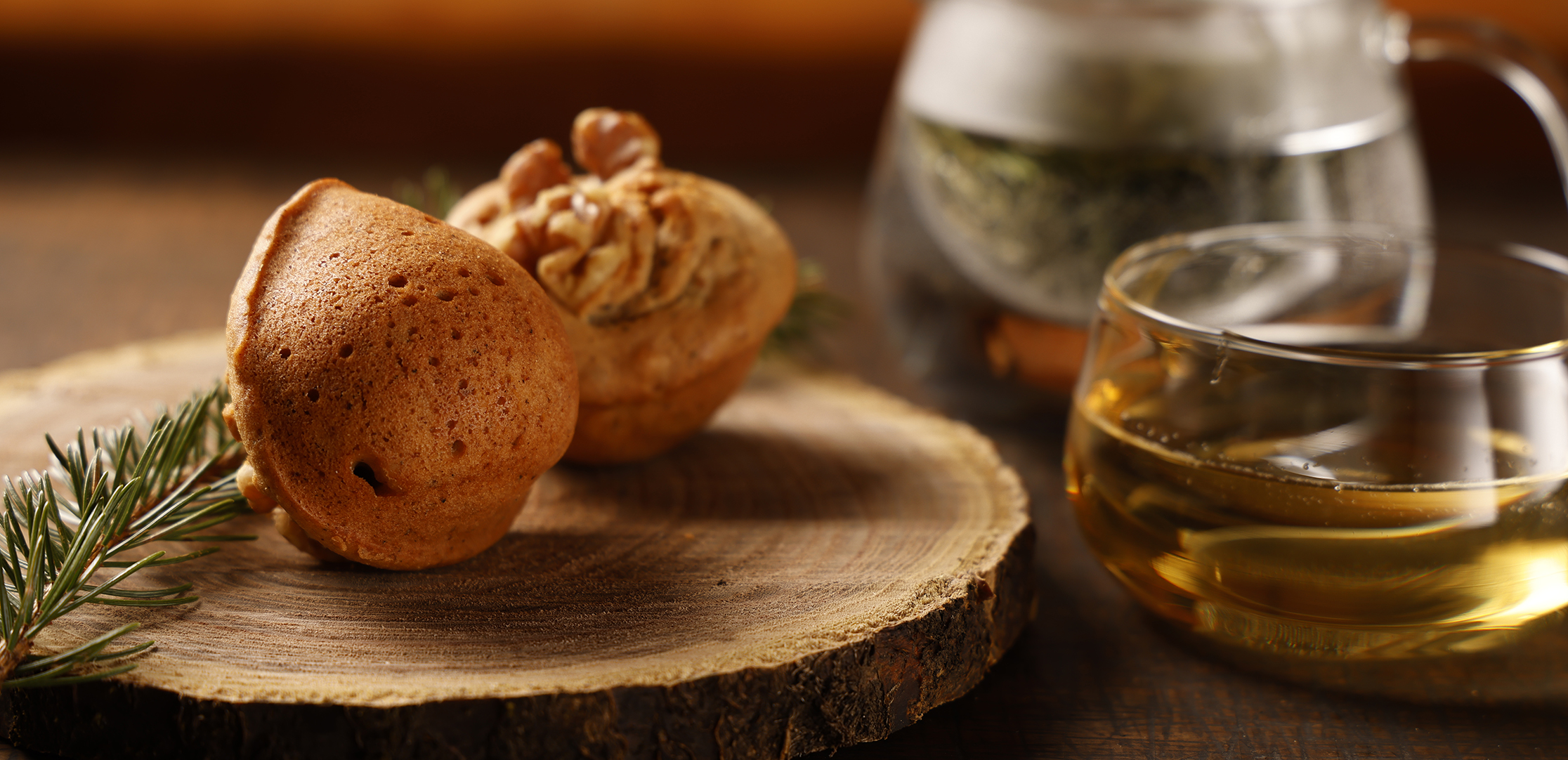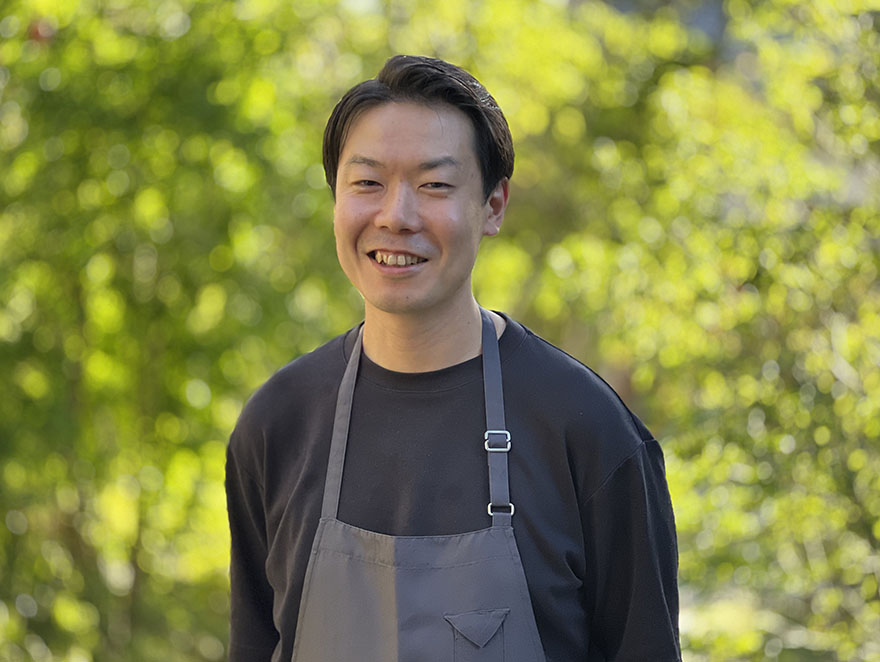concept

concept
We are deep in the mountains,
but we don’t offer “mountain food”.
The main ingredients of Oze Jucho are wild vegetables, vegetables, cod, herring, pork, and gibier. In honor of the late Ken Kaiko, who created the “Okutadami Fish Growers Association” and promoted “catch and release”, we do not serve char, cherry salmon, or wakasagi from Okutadami Lake in our dishes. We also do not serve a large quantity of wild game from the viewpoint of respecting the dignity of life. We receive comments from people who want to eat bear hot pots and other dishes that can only be found deep in the mountains, but the recent “bear boom” in many places has gone too far, and hunting is being accelerated not for the sake of human survival but to create popular dishes. Yoichi Sato, the second-generation owner of the Murasugi Hut where Mr. Kaiko stayed, says, “The only source of protein in this area is the bear. The only source of protein around here is cod and herring. We hunted rabbits and bears in the winter, but we didn’t take more than we could live on. That’s why we didn’t serve it to our guests. It was summer when Mr. Kaiko stayed here, so I am sure he did not eat wild game. My father bought pork and beef from the village and served them once a week or so. Because of this, Oze Jucho’s meat dishes are mainly pork.
Another important factor is seasoning. We do not use any chemical seasonings or food additives, as we want our customers to be able to sense the delicate bitterness, acidity, and umami of the wild vegetables and greens. We use fermentation techniques to bring out the umami and season them with homemade fermented seasonings, but we use little salt and basically no sugar, so you may feel that the taste is “bland. In such cases, please try a sip of “Arasawadake Spring Water” before eating. It will awaken your delicate sense of taste. For your sake, we offer a variety of Niigata sake, including the famous local sake “Midorikawa. Midorikawa Brewery has a connection with Keizo Saji, former chairman of Suntory Ltd. The writer Ken Kaiko was a former employee of Suntory, and there are multiple connections between Uonuma City and Ginzanpei in Niigata Prefecture, Suntory and Midorikawa, and Mr. Kaiko. Because of this background, only Suntory beer is served at 10 Stories Hotel OZE Oze Jujo. Whiskey is also only Suntory’s. Mr. Kaiko is also a whiskey lover. Mr. Kaiko was also famous for his love of whiskey. Please enjoy a glass of whiskey on the rocks with a view of the bonfire at night.
Toward “Fusion of Civilization and Primitivism”
I was born and raised in a small village called Higashi Village, Azuma District, Gunma Prefecture (currently Higashi Azuma Town). The village has Azuma Valley, which is known as a famous spot for autumn leaves, and I always had a fishing rod in my school bag. I remember fishing for char and yamame trout on my way home from school, but I couldn’t catch them myself, so I released them into the pond in my garden. When the pond overflowed with fish, my grandmother would grill them with salt and feed them to me.
Dinner consisted mainly of vegetables grown in my grandmother’s and grandfather’s fields, and the rice was harvested from the rice field in the back. I remember harvesting rice with my whole family in the fall. When I was in high school, I hated the rural lifestyle and longed for the city, but once I entered the world of cooking, the rich memories of my childhood were always at the back of my mind.
When I turned 25, I took the plunge and went abroad, but instead of choosing a restaurant in Paris, I chose a one-star restaurant in the mountains, about an hour’s drive from Nice in southern France. Every day, we receive vegetables, truffles, and sometimes a piece of tuna, and it was shocking to see the deep bonds between chefs and producers, and at the same time, we learned the importance of protecting the surrounding land and sea.
After returning to Japan, he worked at a restaurant in Tokyo and then at “10 Storeis Hotel”(Jiyujin Co., Ltd.), which promotes “local gastronomy.” After working at Matsumoto Jujo, I became the chef at Oze Jujo, and what I feel now is that Japan’s mountains are truly rich.
Japan is rich in mountains, with lots of rain, high temperature and humidity, and has four seasons, even more so than France, and Japan is probably the only country in the world where rivers flow like capillaries in every corner of the country, watering their basins.
The richness of the mountains that I felt when I was a boy. It’s the scalding sensation of salt-grilled char, the sweetness of freshly boiled corn, the pulp that scatters when you bite into a tomato that has been cooled in water, and the feeling of finding a roasted sweet potato in work gloves from a burnt rice husk. ….
The cooking theme given to us by creative director Iwasa is “a fusion of civilization and primitiveness.” I don’t really like dishes that are plated with tweezers or dishes that are painted with colorful sauces, but I’m the type of person who wants to plate delicious food with a bang. I learned the benefits of wood fire and charcoal at Matsumoto Jucho, but I’m someone who wants to incorporate not only an authentic style but also cutting-edge cooking techniques.
Memories of childhood, “primitive” deliciousness. I would like to express the Oze/Oku-Tadami area by fusing the “civilization” techniques I learned over the past 20 years since my culinary school days, and the “culinary culture” I learned in France.
I don’t dare to talk about things like “sustainable”. For me, who grew up in the mountains, “sustainable” comes naturally to me. This is commonplace here at Oze Jujo. We hope that you can experience with your body and all five senses how natural and sustainable mountain living is.

Takuhiro Aoyagi
Chef
Born in Higashi-mura, Agatsuma-gun (now Higashi Agatsuma-cho), Gunma Prefecture. After graduating from culinary school, he worked in a French restaurant in Tokyo before moving to the one-star restaurant Clos St Pierre in Provence, southern France. After returning to Japan, he worked as sous chef at La Coupe d’Or in Shirokane-Takanawa, Tokyo. He then became interested in the 10 Stories Hotel (Jiyujin Co., Ltd.), which promotes local gastronomy in all its establishments, and joined the company, where he was posted to Matsumoto Jucho. In the spring of 2024, he was appointed chef at Oze Jujo.
